- Home
- William Goldman
The Temple of Gold Page 2
The Temple of Gold Read online
Page 2
And one hot, rainy afternoon I was sitting in my father’s chair, watching them. Having just eaten lunch I was feeling pretty at peace with the world when, for some reason, I got to wondering if guppies ever were hungry. I clambered down from the chair, walked over, and stuck my nose against the glass, staring at them cross-eyed. Then I ran and asked my mother, who was sipping tea with Mrs. O’Brien, a neighbor from a couple of houses down. When I asked her, my mother smiled at me, and I’ll never forget what she said: “Why of course they do, Raymond. Just like people, they have to be fed. Now run along.”
So I ran along, back to the study. And a little later, when I saw that big jar sitting high on a bookshelf, I knew, just as sure as God made green apples, that it was guppy food. So I took it down, looked at it and, after a while, I sprinkled some on top of the water.
Those guppies went wild, swimming around, zooming up to the water top, opening their mouths, zooming down, then up again. They were so cute I almost wanted to cry. I sprinkled some more food. They ate that too. So I took the lid off the jar and poured the whole thing on top of the water where it lay like a roof. And even now, the idea of living in a house where the roof’s made of food is pretty close to my idea of heaven. They were still eating away when I tossed the empty jar into the wastebasket, closed the study door, and left them.
Along about five that afternoon I was playing in my room when my father came home and a little later I heard him talking with my mother. After which I heard him coming upstairs, and then there he was, standing in the doorway, looking like he’d never looked before.
“Did you feed the guppies?” he asked, and he didn’t purse his lips or do anything to his forehead. The words just shot right out.
“Yes,” I answered. “Yes sir.”
Then he had me by the arm, dragging me down the stairs while my mother stood at the top yelling: “Be careful! Be careful! Be careful!” and then we were in the study with my father yelling: “Look! Look!” and pointing. I looked.
The guppies were dead. Bloated, they lay motionless on top of the water.
“You see!” my father yelled. “You see! You did that! That’s your work!”
I was about to answer, but I couldn’t, because right then I started to cry as he grabbed my arm again, pulling me down to the basement.
Water was hanging in big drops from all the pipes down there, it was so hot. My father took off his coat, dropped it on the floor. Then his vest, and tie, and shirt. Then he stood up, pale as snow.
I was crying when he took me over his knee and gave me my first and only beating. He kept slapping down hard and at first it only stung, but then that gave way to pain. It hurt like hell but he kept on, and with each blow he swore at me: “Damn you. Damn you. Damn you. Damn you!” I couldn’t twist away he was holding me so tight, but once I managed to turn and see him. He was wet all over. It was the only time I ever saw him perspire; even on the hottest summer day, his skin was dry.
The rest of it is pretty hazy. I suppose I got hysterical, and then it was over with me lying on the cold stone floor of the basement, not crying tears any more, because they were gone. Used up. My mother took me to my room, cared for me some, and after a few tense days, the status quo set in. Nothing was ever said of it again.
Except once, long after. I knocked at the door of his study, which was now always closed, and when he said to come in, I did.
“What is it, Raymond?” he asked me.
I blurted it out. “I just wanted you to know I loved those guppies too,” I said.
He took the pipe from his mouth and stared at me for a long time. Then he pursed his lips; wrinkled up his forehead. “Guppies?” he said. “What guppies?”
My Grandmother Rae was my father’s mother who was almost dead when she came to live with us, she was that old. Small and skinny, she was practically bald, so she always wore a black hairnet to disguise it, which did the trick about as well as an “I am bald” sign would have done. She came to our house when I was seven and went immediately to the maid’s room, which was empty, seeing as we never had one. Once she got inside that room she never, never left it, except maybe for an occasional trip to the bathroom. But even that wasn’t a sure thing.
I always saw her at mealtime. Since she never left her room, food had to be brought to her and, not surprisingly, I was elected. So, three times a day, I made the trek up from the kitchen with her meal and then, when she was done, I’d carry the empty tray down again. It all went smoothly the first few weeks. Then one night, after supper, she held out her hand.
“Here, boy,” she said, handing me a dime. I asked her what for. She pointed to the tray. “I always pay my share,” was her answer.
Which confused me, so I had a chat with my mother about it. Naturally, she told me it was just the old lady’s way of being nice and I should be the same and accept it graciously. But it still didn’t seem right; you just don’t take money from an old woman living alone up in your maid’s room. So the next morning I gave the dime back to my mother and told her to return it to Grandmother Rae. Which worked out fine, since I found out later that my mother had given her the money in the first place, because the old lady didn’t have a penny in the world to her name.
And that was how the round robin was established.
Every evening my mother gave her a dime and the next night I’d get it back and give it to my mother. That was the way it went and it turned out to be one of the greatest games I ever played. We kept one dime—dated 1919—in circulation for over two months and the only reason it wasn’t longer was because my mother slipped up one morning and gave the dime to the milkman. I was really sorry when it got away and even now I still think I’d give a lot more than ten cents to get it back.
I always remember my Grandmother Rae as a cripple. She wasn’t. She could walk as well as anyone. But I still remember her as such, a crotchety old crippled lady living out her days in the back room of my house. And she was crotchety. She didn’t like anyone, including my father, who was her own son. Sometimes he’d go back to visit her, but not often, and my mother even less. I was her main connection with the world beyond the door, and I know she didn’t like me. I know that because she was a mutterer. She kept up a steady stream of conversation all day long. It didn’t matter if someone was in the room or not, she’d just talk away, about how dumb the boy was (being me), or how slow the boy was, or how the bathroom pipes leaked so she couldn’t hear herself think, or whatever else came into her head. She was old and gray and full of sleep—Zock taught me that one—and I think only one thing in the world made her happy.
Reading to me.
She loved that. The only books she’d ever read were the Winnie-the-Pooh stories. After supper, after she’d given me the dime, I’d pull her chair over to the lamp, or the window if it was summer, and she’d read me a chapter from one of the books, which secretly I believe she knew by heart. And it’s a shame there are only two of them, because if there’d been more, she probably would have lived awhile longer.
So I’d sit there on the floor, listening to the adventures of Pooh and Piglet and Christopher Robin and all the things that went on in the Hundred Acre Wood. And if Grandmother Rae couldn’t do much else, she could read those books—her head bent over, her lips moving slowly, her voice full of excitement. It was beautiful. Because she believed in the Hundred Acre Wood. She had been there. It was real. So it wasn’t that she was reading to me as much as she was telling me about what had happened to her. As if she had been present at Eeyore’s birthday party, had sat up in the tree when Pooh rescued Piglet with the honey jar.
And I believed it too. I knew the Hundred Acre Wood like I knew the cracks in the ceiling over my own bed. And I’d think—as I listened to her reading, I’d think: “That’s a nice place, that Hundred Acre Wood. That’s a place for me. You can take me to that place any time.”
Naturally, I never got there. And even my visiting stopped, because one day, the old lady died. I suppose I have known more th
an my share of death, but hers was the smallest. Nobody cried. Nobody said, “What a tragedy.” She just was, and then one day, she wasn’t any more. Like a pebble thrown far out in a pond when you’re not looking. You hear the sound, but later, when you turn slowly to look, the ripples are gone and the top of the pond is smooth again. ...
As I remember my father for what he once did, I most remember my mother for what she once did not do. Again, this isn’t fair, since she was a fine woman, loving wife, good mother, etc. But memories are often like that.
She was a pretty girl whose parents were religious missionaries in India. They died of some plague, both at the same time, which, although it shook her up when it happened, isn’t half as bad as it might have been. Together is a good way to go. She attended Athens College and when she was a sophomore she had a class in Greek Literature taught by my father; when she was a junior they got married; the year she would have been a senior, I was born.
I have already said how my father was a famous scholar. Once I went to a speech he gave and heard him introduced as “America’s leading expert on Euripides,” a pretty silly way of introducing anyone, but still I believe it to have been the truth. And my mother, with the zeal probably inherited from her missionary parents, threw herself into the job of being the wife of America’s leading expert on you-know-who. She was a pillar of society, my mother, and I say that without malice or scorn, because if you don’t have pillars, then society would fall down on your head, and my mother just happened to be one.
And if it was my father who gave up on me, it was me, in turn, who gave up on my mother. There was never any clean break. We kept arguing about the usual things, such as would I or would I not wear long underwear in the wintertime or rubbers in the rain. We always spoke to each other, her trying to guide me as a mother should and me obeying, more often than not, as a son. But still, after what happened with Baxter, nothing was ever the same.
Giving credit where it’s due, I freely admit that had it not been for my mother, I never would have gotten him in the first place, as my father was against it from the start, mainly because he didn’t like dogs. You couldn’t help liking Baxter though, since he was far and away the greatest animal ever to walk on four feet, a thoroughbred cocker spaniel, small and golden brown. Once I got Baxter—which happens to be my father’s middle name, proving I was no moron even then—I was almost never home, but rather out in the ravine or running around the neighborhood or down at the beach.
All of which secretly suited my mother, I think, because she was at that time challenging for the lead in the faculty wives’ league and the local PTA. There were always meetings going on at my house, three and more per week. My father took to coming home later than usual, for he and I shared a very strong dislike for anything resembling a faculty wife.
The day it happened there was a big PTA meeting at our house, so I obviously planned to be absent. Which I was. I went down to the beach and skipped stones awhile. Then I threw sticks for Baxter to fetch, trying to fake him out by pointing one direction and throwing in the other. I didn’t fool him once, since he was smarter probably than I was, even though I was more than eight at the time. Finally, I got bored and he was panting some, so we headed for town, and right when we crossed the main street with me watching it all, Baxter was run over and killed by a big gray car.
At first I didn’t believe it but just stood there as the car ground to a stop and the driver got out. He came back and looked down at Baxter. Then he prodded him with his shoe. When I saw that I let out a yell and went tearing up, not caring about the people gathering around or the honks from the other cars stymied there on the main street of town. I was screaming blue murder and nothing anybody could do would make me stop, so finally they all stepped back. I bent over Baxter, picked him up, cradling him in my arms, the blood from his body slopping onto my clothes.
Then I started home. Because I was crying, the trees, the grass, the sky, everything melted together and I saw mostly the color green, a long tunnel of green with me in the middle, walking through it, going home. I kept expecting Baxter to come to, so I shook him every so often. We were both drenched with blood and my stomach ached from crying and that walk is the closest I ever expect to come to the march on Calvary.
Kicking the front door open, I went into the living-room. It was set up like an auditorium, with rows of wooden, stiff-backed chairs, an aisle down the middle, and a speaker at the front—who happened to be my mother. When she saw me, she stopped talking and stared. All the others did the same, turning, watching me as I stood there holding Baxter, the both of us covered with blood.
“Baxter’s been murdered,” I said, and right away the room was full of buzz-buzz-buzz. But nobody moved. “Baxter is dead,” I said again, staring straight at my mother.
She just stood there. I was looking right into her eyes, the both of us like statues, and in her eyes I could see it, that she was ashamed. Of me.
I turned and made for the door when I heard Mrs. O’Brien saying: “You girls go on with the meeting. I’ll take care of Raymond,” and then she had an arm around me, not caring about the blood. She was a fine woman, Mrs. O’Brien; built kind of like a cube, but fine nonetheless.
She talked to me awhile, saying that probably we ought to bury Baxter, seeing as how he was dead. I nodded, and went to get the shovel from the garage. Then we both walked into the ravine. Putting Baxter down gently, I started to dig. When the hole was large enough, I set him inside and began covering him. While I was doing that my mother came down and told me how sorry she was. But she was too late. Even though the next day she bought me a new dog, she was too late. Because soon afterward Zock moved in next door and that changed everything. So it was that afternoon, during the big PTA meeting, when my mother and me said good-by.
Which takes care of my family.
If I have treated them unfairly, I didn’t mean to. They were a good family, as families go, and I have no complaints. What I am, I suppose, I am either because of or in spite of them, which amounts to the same thing. And if they were not the parents I would have picked, had I been given the choice, I know that I am not the son they would have chosen. So it all ended even. And in this world, you can’t ask for more.
The Boys
I FIRST HEARD OF Zachary Crowe one night at supper. We were eating, and my mother was talking away to my father about Mrs. Janes, the wife of the English professor who, according to my mother, had practically ruined a meeting that afternoon by arriving “in her cups,” as she always put it. My father didn’t even look up from his lamb chop as he pursed his lips, wrinkled his forehead and said: “Indeed?”—which was by all odds his favorite word. And then my mother said: “Really, Henry, something ought to be done about it,” and he said: “Of course, my dear,” and went on sawing at his food.
“And I paid a visit to the new neighbors this afternoon,” my mother went on. “She seems like a lovely girl.”
“Neighbors?” my father asked, just to keep things alive.
“The new ones,” I told him, pointing with my fork. “Next door.”
“Raymond,” my mother said. “Please don’t do that. Yes,” she continued. “He is the owner of that new clothing shop.”
“Indeed,” my father said.
“And Raymond. They have a boy just about your age. He seems like an absolute angel.”
“Indeed,” I said, immediately not liking him.
“Such fine manners,” she went on. “Zachary. His name is Zachary.”
“You’re kidding,” I said. “Nobody’s named Zachary.”
“I think it’s a fine name,” my mother said. “And it wouldn’t do you any harm to be nice to him. Would it, Henry?”
“Indeed,” we both said together.
So the next morning I sauntered over and began playing half in their back yard and half in mine. After a while he came out, started doing the same. When we got to within a few feet of each other, I stopped and gave him the once-over.
Zoc
k was ugly. His eyes were terrible even then; he had black, kinky hair and obviously must have worn braces every day when he was younger. Lots of people are ugly at the start, but then, as they grow, they get more presentable looking. Not Zock. He got uglier all the time. When we went through the pimple stage he was always way out in first place. You’ve heard of a face only a mother etc. Well, his was it.
“I hear you’re an absolute angel,” I said to him that morning.
“I hear you’re not,” he came right back, which threw me, because I didn’t know how the news had spread so fast.
“Where’d you hear that?” I asked.
“Around and about,” he answered. “Around and about.”
“Yeah,” I said. “Well.” And then I stopped, not being able to think of anything to put after it.
“Well what?”
“So your name’s Zachary,” I sneered. “That’s a good name for a dog.” Which got to him, I know, because he really liked his name. One of the things I’m sorry about is that once I got started, nobody called him Zachary again. But only Zock. Even in school, the teachers called him that, which, as I said, is my fault. Because one day I was thinking of nothing in particular when the words “Zichary Zachary Zock” came into my head. I began calling him that, and then just Zock alone. It caught on, and poor Zachary went right out the window.
“Yes sir,” I went on. “Zachary is a good name for a pig.”
“Glad to meet you, Zachary,” he said, which I decided then and there was enough of an insult. So I shoved him, knocking him down, and when he got up, I did it again.

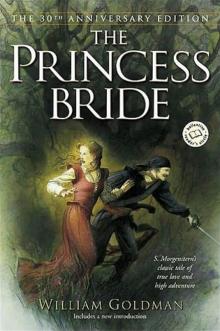 The Princess Bride
The Princess Bride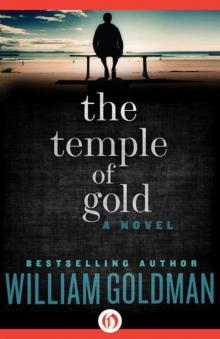 The Temple of Gold
The Temple of Gold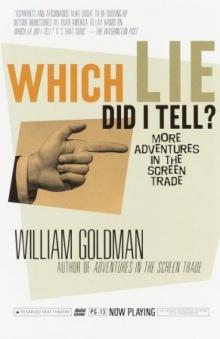 Which Lie Did I Tell?: More Adventures in the Screen Trade
Which Lie Did I Tell?: More Adventures in the Screen Trade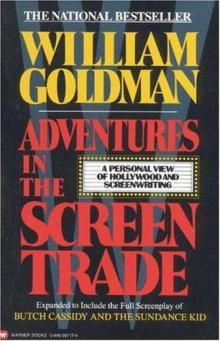 Adventures in the Screen Trade
Adventures in the Screen Trade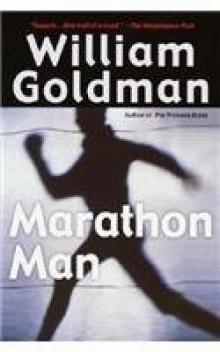 Marathon Man
Marathon Man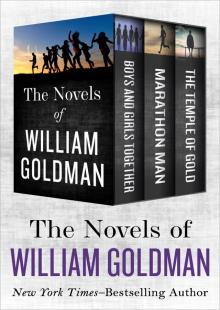 The Novels of William Goldman: Boys and Girls Together, Marathon Man, and the Temple of Gold
The Novels of William Goldman: Boys and Girls Together, Marathon Man, and the Temple of Gold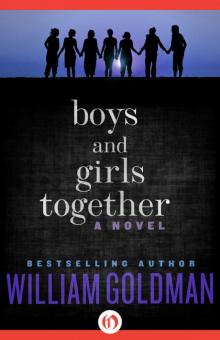 Boys and Girls Together: A Novel
Boys and Girls Together: A Novel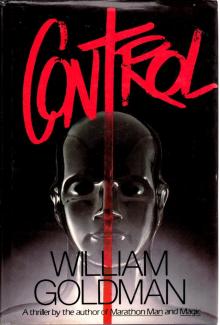 Control
Control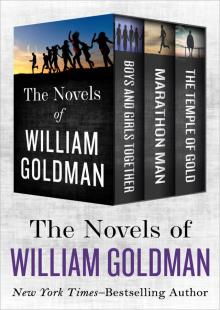 The Novels of William Goldman
The Novels of William Goldman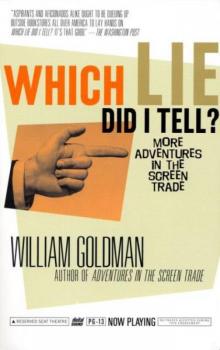 Which Lie Did I Tell?
Which Lie Did I Tell?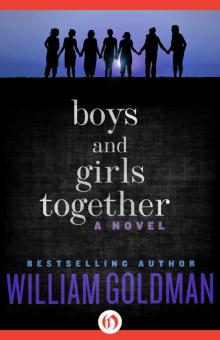 Boys & Girls Together
Boys & Girls Together